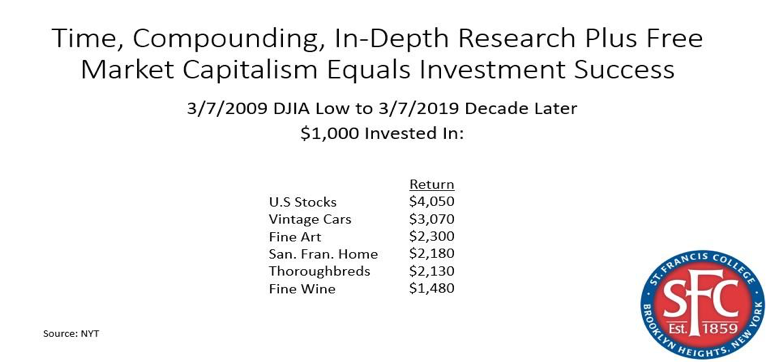Wealth Creation and Capital Formation
History records that the ideal time to create wealth and capital in the USA is during sustained periods of low inflation. To our nation's benefit, inflation has been under wraps since President Reagan's first term in office. Despite enduring five recessions since 1980, the Dow Jones Industrial Average for example, has risen from a low of 777 in 1982 to a high of over 27,000 this year. Over the last ten years our mature cyclical $20 trillion consumer dominated economy has been generating ongoing prosperity.
There is no denying the last recession the USA endured was the worst downturn since the Great Depression of the nineteen thirties. It began in December of 2007 and ended in June of 2009. As of July, of this year, the ongoing decade plus healthy stretch of economic prosperity is the longest ever recorded. Since World War II, the average upturn lasted about six years.
It is most difficult to precisely forecast what will be the catalyst that kicks off a recession. Recessions are defined as at least two back to back quarters of negative GDP growth. These pullbacks typically erupt when consumers over-spend, over-borrow, over- speculate and under-save. Hyper enthusiasm in consumer real estate was the primary cause for the most recent recession. Since WW II, the typical reversal has lasted about ten months.
It is truly hard to fathom that the United States home to just under five percent of the world's population produces twenty four percent of world GDP. The USA has been dramatically blessed with high quotients of productive land, labor, capital, management and technology and has nurtured them well. These enormously potent resources coupled with the nation's awesome defense capabilities accounts for Uncle Sam being the globe's sole surviving superpower.

Pundits, professors, corporate chieftains, money managers, politicians and others, often proclaim that capitalism is the ideal economic system to create both wealth and capital so that each generation can enjoy higher living standards than the previous generation. This is certainly a worthwhile goal but obviously not one achieved by all consumers and citizens all of the time. Capitalism affords much needed economic freedom to risk-takers who will either succeed or fail. The competition generated in the entrepreneurial process however, spawns' healthy upticks in efficiency and profitability. Capitalism outperforms socialism but the downside of capitalism is that its rewards are not evenly distributed throughout society.
Our economy's foundations remain quite sturdy but are not without some deep potholes and hefty pitfalls. On the plus side among others, the USA leads the world in higher education, labor market flexibility, quality of corporate leadership, capacity to innovate, owning the lion's share of the globe's technology patents and, capital markets transparency. Conversely, the nations to do list is dangerously intensifying. Despite throwing billions of dollars at the nation's public-school systems, they continue to falter. Our physical infrastructure demands immediate upgrading. Moreover, even though our economy is on a solid uptick, the US federal budget continues to rise. Not to mention that the student debt bubble could cause a financial calamity.
Economics is a behavioral science as is psychology, sociology, criminology and cultural anthropology. The more knowledge amassed about individuals, groups and the cultural makeup of a specific group the higher the odds future behavior patterns can be surmised. Finance is applied economics. The more one knows about the capital markets the less difficult it is ascertaining the cost of capital and the potential return on capital outlays. Investment in large measure, is nothing more than applied finance. Obviously, finance and investment are not physical sciences but are also behavioral sciences just like economics. This is what we teach our finance students.
SFC's finance students garner the knowledge and tools it takes to perform in-depth security analysis to deduce whether or not a specific equity or fixed income investment is undervalued, overvalued or fairly valued. This analysis also helps them spot certain social, political, economic and demographic trends that could be long term in nature that might possibly benefit our nation's capital formation and wealth creation apparatus. The reverse is also be true. Certain negative trends that could cause the economy to suffer harm could also be discovered. One of the objectives of the lecture series is to be aware and to analyze the strengths, weaknesses, opportunities, and threats that could impact our nation's resource base.